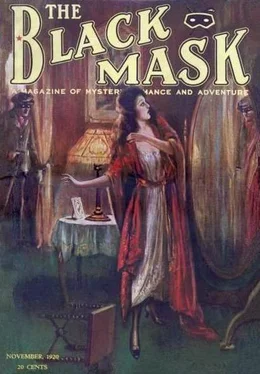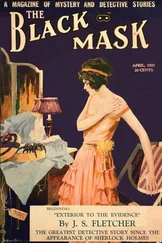Hamilton Craigie - The Black Mask Magazine (Vol. 2, No. 2 — November 1920)
Здесь есть возможность читать онлайн «Hamilton Craigie - The Black Mask Magazine (Vol. 2, No. 2 — November 1920)» весь текст электронной книги совершенно бесплатно (целиком полную версию без сокращений). В некоторых случаях можно слушать аудио, скачать через торрент в формате fb2 и присутствует краткое содержание. Город: New York, Год выпуска: 1920, Издательство: Pro-distributors Publishing Company, Жанр: Классический детектив, на английском языке. Описание произведения, (предисловие) а так же отзывы посетителей доступны на портале библиотеки ЛибКат.
- Название:The Black Mask Magazine (Vol. 2, No. 2 — November 1920)
- Автор:
- Издательство:Pro-distributors Publishing Company
- Жанр:
- Год:1920
- Город:New York
- ISBN:нет данных
- Рейтинг книги:5 / 5. Голосов: 1
-
Избранное:Добавить в избранное
- Отзывы:
-
Ваша оценка:
- 100
- 1
- 2
- 3
- 4
- 5
The Black Mask Magazine (Vol. 2, No. 2 — November 1920): краткое содержание, описание и аннотация
Предлагаем к чтению аннотацию, описание, краткое содержание или предисловие (зависит от того, что написал сам автор книги «The Black Mask Magazine (Vol. 2, No. 2 — November 1920)»). Если вы не нашли необходимую информацию о книге — напишите в комментариях, мы постараемся отыскать её.
The Black Mask Magazine (Vol. 2, No. 2 — November 1920) — читать онлайн бесплатно полную книгу (весь текст) целиком
Ниже представлен текст книги, разбитый по страницам. Система сохранения места последней прочитанной страницы, позволяет с удобством читать онлайн бесплатно книгу «The Black Mask Magazine (Vol. 2, No. 2 — November 1920)», без необходимости каждый раз заново искать на чём Вы остановились. Поставьте закладку, и сможете в любой момент перейти на страницу, на которой закончили чтение.
Интервал:
Закладка:
And so—Masterman awoke at a dazzle of light which struck him full in the eyes. He blinked owlishly—then sat upright with a jerk, his hand reaching for his gun and then falling at his side at the crisp voice of the detective:
“I’ve got you covered, Masterman.”
The yegg cursed, stared a moment wildly; then his pig eyes snapped evilly as Gunson’s other hand, reaching upward behind him, turned up the light. Gunson, putting away his flashlight, bent a hard eye on his prisoner.
“I want you, Masterman,” he said evenly, “you rotten killer—step lively, now—you hear?”
But Masterman, his composure returning after that first, amazed glance which had assured him that Gunson was unarmed, spoke, sneeringly confident:
“You’ve got nothing on me, Gunson,” he said, his heavy face, with its blue-shaven jowls, assuming a satiric mask. “You can’t prove nothing.”
“I have—or rather you have,” replied Gunson cryptically, “and I can prove everything,” he was beginning. “Shake a leg now—” when abruptly there came a startling reversal.
Not for nothing had Masterman abode aforetime in that haven of the dwellers by night—Paris, of the thousand eyes. And among other accomplishments of that grim underworld of the Apache, most ruthless of his kind, had he acquired a more than average efficiency in the art of La Savate. Now, at Gunson’s crisp command, he came suddenly into action.
His right foot, shod with its pointed boot, swung upward in a bone-smashing kick, almost too deadly swift for the eye to follow, aimed at the detective’s face. The impact of that bruising kick would mean unconsciousness, a broken jaw—or worse.
But if Masterman was consummate in the attack, in the lightning upthrust of that deadly lunge, like the swift swing of a javelin, Gunson was not unprepared. There is but one parry for that abrupt passade: a single, deft movement, an estoppel as swift and certain as the delivery of the kick itself.
Gunson moved his head a scant half inch to the right, as a boxer evades the whiplash of a straight left, his hand at the same instant curving in a short arc. His fingers closed like iron about the yegg’s ankle—there came a quick heave, an abrupt explosion of movement, and Masterman crashed downward to the floor.
He glared defiance and implacable hate, merged, however, with a certain respect. But still he rasped out, between panting breaths:
“You’ve got nothing—on me—Gunson—you think—you’re wise, don’t you?”
“You’ve—got it—on yourself,” repeated Gunson. Then he leaned over the fallen man, his words, slow, bitter, dripping with the still acid of a corrosive vengeance:
“You’re slick, Masterman—but—you overlooked one thing... one little thing... you’re in, bo—up to your neck — heels over head, I’ll say.” He barked a short, grim laugh. “I had the motive — all I needed was a clue—and I got it — at No. 32, while I was watching the firemen coming out. You croaked Darragh because he’d seen—this—”
With his free hand he jerked from his pocket the purchase he had made at Spanish Joe’s, thrusting it before Masterman—a sinister exhibit indeed—the “ghost” of Darragh’s perfervid dreams — a gas mask of the French type, long-snouted like a boar, terrifying, indeed, as an accessory to silent halls, dim night, and alcoholic imaginations.
“But that isn’t all, Masterman,” continued the detective. “It’s not a circumstance to this—thing you’ve fastened on — yourself.”
He stooped, his voice rising to a note of triumph:
“You’re in, Masterman — ankle-deep!” he cried, bending swiftly, and jerking the half-laced shoe from the foot of the murderer.
“Yellow!” he exulted, “and that’s your brand, you shillaber.”
For, as acid acts on litmus, so chlorine impregnates with its revealing color change the substances which it touches.
Across and across, where the blue sock of the murderer came above the protection of the shoe, there shone the stigma of an ineffaceable guilt: the ineradicable, inescapable, indelible proof, even as Gunson had seen it on the stockings of the firemen—the revealed and all-revealing stain: a broad band of staring yellow!
The Murder at Lost Creek
by Robert E. Hewes
I
Strange things take place in the north country, m’sieu, but I have known none more strange, or terrible, than what happened that night in the lonely cabin on Lost Creek, — the night the wind wolves danced. Ah, m’sieu, even now I can see the way that man lay there, the knife blade gleaming—what of it was not buried in his heart, and feel the cold fear that crept down my back. Ugh! But I should not dare tell this story to even you, m’sieu, was I not very sure you could never find the place.
It was a bitter night, m’sieu, that I was caught in a storm up in the Height-of-Land country. Even the oldest woodsman is fooled sometimes, and the storm came up even quicker than I had expected, catching me many miles from my cabin.
I thought I knew my trap line well, but after dark, when the snow devils build strange shapes out of the drifts, then tear them down again like children knock over play houses to make something else, familiar landmarks look queer and unnatural.
I had no compass and the stars were smothered by the clouds that shook loose the snow that floated down, swirling, steady, suffocating, filling up trails and leavening valleys until the northland was one great white plain with no end and no beginning.
Ah, m’sieu, for long hours I floundered helplessly in that night of terrible whiteness, utterly bewildered. The soft snow underfoot, clinging in the manner of new fallen flakes, seemed to be tugging at my boots, striving to pull me down. And the hard sleet pellets that flew through the air in a straight line stung my eyes till I was almost blinded and cut my face till the blood came. Then the frost crept in and seamed my, skin with great, aching cracks.
It is a terrible thing to be lost in the north country in a storm such as raced in a mad dance that night. The cold was a cruel, searching thing, that crept into one’s bones and sucked at the marrow.
I stumbled along blindly, hour after hour, and always that terrible cold clawed at my vitals and always I could hear the wind devils howling like hungry wolves, eager for their prey. My throat burned from thirst, and each time I thrust a handful of snow in my mouth it was dry like chalk dust and I blew it out still unmoistened.
I knew I was far off my trap line, wandering somewhere far into the lonely north, but I was even farther than I thought. Many times I fell, and each time it was longer before I got up. As I lay in the snow a strange warmth would creep over me and I grew drowsy — why not sleeps I thought; after all, what did it matter? And I knew that soon I should fall and not rise again. Then, with the sleep imps tugging at my eyelids until I felt I could no longer resist them, I saw a light.
I tried to cry out for joy, but my throat was so parched I could utter no sound.
I could see that the light was in a little creek, some trapper’s cabin, I thought, and stumbled toward it madly, rubbing my eyes with my fists to keep them open. Twice the light vanished, and each time tears came to my eyes, while I sobbed like a child. Then, each time, a lull in the whirling world of whiteness showed it again. I thought I should never reach it, and was sobbing from despair when suddenly I saw a shadow loom before me and I fell against a door.
The next moment there was a sudden blaze of light that blinded me and a blast of warm air against my face.
I was conscious of falling forward on a hard floor, and of a woman’s frightened cry. Then all was black.
Читать дальшеИнтервал:
Закладка:
Похожие книги на «The Black Mask Magazine (Vol. 2, No. 2 — November 1920)»
Представляем Вашему вниманию похожие книги на «The Black Mask Magazine (Vol. 2, No. 2 — November 1920)» списком для выбора. Мы отобрали схожую по названию и смыслу литературу в надежде предоставить читателям больше вариантов отыскать новые, интересные, ещё непрочитанные произведения.
Обсуждение, отзывы о книге «The Black Mask Magazine (Vol. 2, No. 2 — November 1920)» и просто собственные мнения читателей. Оставьте ваши комментарии, напишите, что Вы думаете о произведении, его смысле или главных героях. Укажите что конкретно понравилось, а что нет, и почему Вы так считаете.












